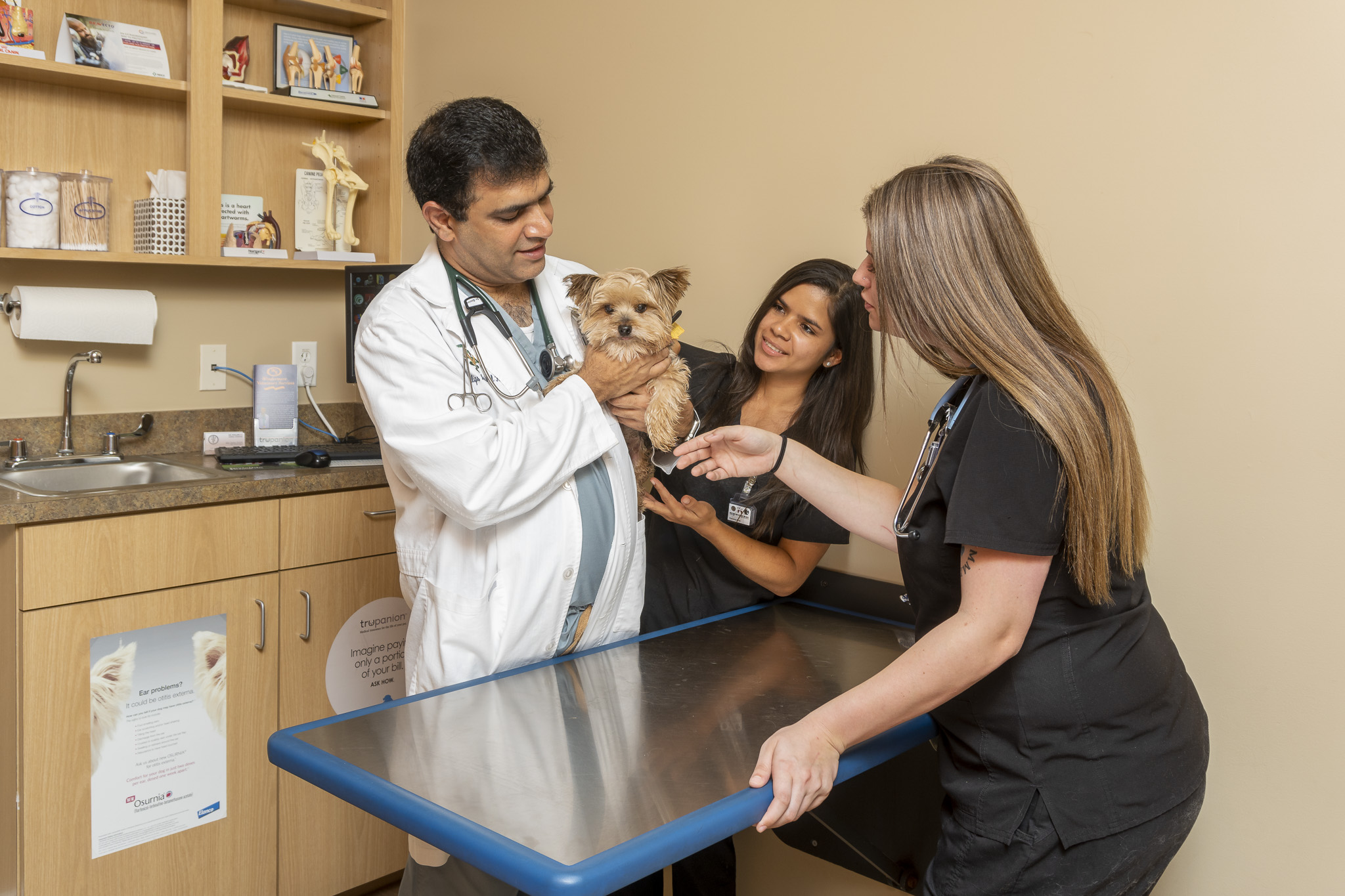
We're here for you
Emergency?
If your pet is exhibiting concerning symptoms or experiencing a medical emergency, please call our clinic at (407) 352-2579. We’ll help you through it.

People and pets can be prone to the occasional cough or shortness of breath. However, if your pet is showing signs of heavy or slowed breathing, there may be a bigger health problem at hand. Oftentimes, difficulty breathing coincides with other troubling symptoms such as pain or lethargy in animals. These symptoms, if left untreated, could lead to chronic, long-lasting complications.
Don’t hesitate to contact your nearest vet clinic if your pet is exhibiting labored breathing. The sooner they get treatment, the less likelihood of severe complications and the sooner you can help them find relief and get a breath of fresh air.
Common Causes of Heavy Breathing in Pets
Heavy breathing is much more likely to occur in dogs than it is in cats, however, no matter what kind of pet you have, these are the most common causes of heavy breathing to watch out for:
Heat
Heatstroke can be dangerous. While we might think that overheating only occurs on a hot summer day, it can also be due to pets being left too long in the car, over-exercising, poor ventilation, or lack of hydration. When pets overheat, their bodies will compensate by breathing heavier in an effort to try and cool themselves down. If you notice other symptoms of heatstroke in your pet such as hot skin or fast heart rate, take them to the vet immediately.
Asthma
Asthma is commonly triggered by environmental allergens such as mold, smoke, or dust. It can lead to wheezing and heavy breathing when pets are exposed to those irritants in the surrounding air. If you suspect your pet is having an asthma attack, ask a vet for tips on how to manage their unstable respiratory rate.
Heartworm
Caused by foot-long parasites, heartworm is a disease associated with a degradation of the blood vessels that affects the lungs and heart. This fatal disease can cause difficulty breathing in pets and must be treated with steroids or other anti-parasitic medication. Other symptoms of heartworm include rapid weight loss and an inability to exercise.
Heart Failure
Congestive heart failure in pets occurs when the heart cannot pump blood throughout the rest of the body. When this happens, they can start breathing heavily due to the lack of oxygen being carried to their lungs, as well as the buildup of fluid. Alongside heavy breathing, pets may also have shortness of breath and swelling around their chest or belly.
Anemia
If a pet has low hemoglobin levels, this can be a sign of anemia. Anemia can become a problem in pets when they are not getting enough oxygen in their blood. This lack of oxygen can cause heavy breathing, bloody stools, and an extreme lack of energy. To treat the symptoms of anemia, pets are commonly given new diet plans, supplementation, or in severe cases antibiotics.
Respiratory Infection
Both upper and lower respiratory tract infections can cause symptoms of heavy breathing in pets. These are the most frequently occurring respiratory infections in pets.
Bronchitis
Bronchitis presents itself when the airways become too inflamed from the presence of a virus. When animals' immune systems are unable to combat a bronchial infection, they can start coughing up mucus and breathing heavily. Bronchitis can also cause symptoms of fever and lethargy.
Calcivirus
Most commonly occurring in cats, calicivirus is an upper respiratory infection that shows symptoms similar to a cold such as congestion, runny nose, and a cough. When a cat is affected by this viral pathogen, it may start wheezing or breathing heavily until they are able to be treated under the care of a veterinarian.
Kennel Cough
Kennel cough is a rapidly spreading bacterial infection most present in dogs. The infection is commonly associated with a loud, dry, honking cough. This gagging cough can make it difficult for canines to breathe, causing them to take deep and heavy breaths. To treat kennel cough a vet will need to prescribe a round of antibiotics.
Pneumonia
Just like humans can get pneumonia, so can our pets. As a bacterial infection, pneumonia causes the build-up of tiny sacs surrounding the lungs and induces irritation and inflammation. This inflammation can cause pets to have shallow or heaving breathing that coincides with frequent coughing.
What Should You Do if Your Pet Is Breathing Heavily?
If your pet has chronic heavy breathing, it’s critical that owners stay vigilant and seek outside care and consultation. Breathing is essential to life for us, and our animals. Take these steps into consideration to help decrease symptoms of heavy breathing in your pet.
Take Your Pet to a Veterinary Clinic
The first thing you should always do if your pet is constantly breathing heavily is take them to the nearest veterinary clinic. A vet can provide the necessary tools and testing to determine what in particular is causing their troubled breathing patterns.
Follow Recommended Treatment Plan
Depending on the unique cause of the breathing problems, your vet may recommend various treatment methods such as:
- Antibiotics
- Antihistamines
- Steroids
- Bronchodilators
- Oxygen therapy, ventilation
- Fluid administration
- Surgery
Preventative Care
While not all causes of heavy breathing can be prevented, there are some ways to reduce the risk of any serious health complications. To prevent a case such as heat stroke, you can avoid keeping your pet outside when temperatures soar, or be sure they are kept in a ventilated space. For cases such as asthma, preventative measures can be taken by identifying allergen triggers and keeping them away from your pet. The more proactive measures pet owners take, the smaller the likelihood of a serious health emergency.

Step One:
Call us to book your pet’s appointment.

Step Two:
Our expert vet will take care of all of your pet’s needs.

Step Three:
Get back to enjoying your happy and healthy life with your furry best friend.

Get the Best Care for Your Pet
Come Visit Dr. Qasim
Book your pet’s appointment with Dr. Qasim to ensure a long, happy life together.

We love and care for each patient as if they were our own pet.
Meet Our Team of Animal Lovers
Dr. Bilal Qasim, DVM, established Dr. Phillips Animal Hospital in 2011 after practicing veterinary medicine for over 17 years with the help of talented and caring veterinary technicians.


